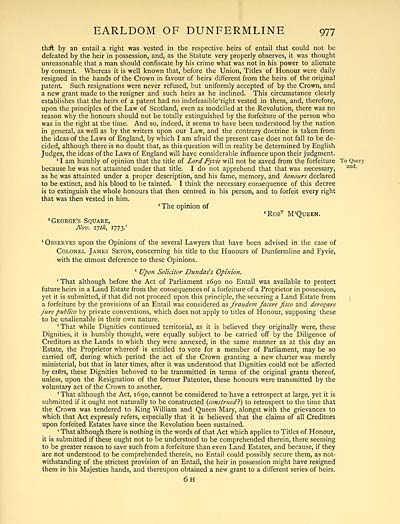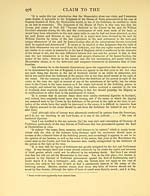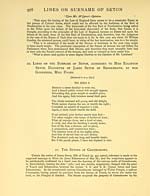Download files
Complete book:
Individual page:
Thumbnail gallery: Grid view | List view

EARLDOM OF DUNFERMLINE 977
that by an entail a right was vested in the respective heirs of entail that could not be
defeated by the heir in possession, and, as the Statute very properly observes, it was thought
unreasonable that a man should confiscate by his crime what was not in his power to alienate
by consent. Whereas it is well known that, before the Union, Titles of Honour were daily
resigned in the hands of the Crown in favour of heirs different from the heirs of the original
patent. Such resignations were never refused, but uniformly accepted of by the Crown, and
a new grant made to the resigner and such heirs as he inclined. This circumstance clearly
establishes that the heirs of a patent had no indefeasible 'right vested in them, and, therefore,
upon the principles of the Law of Scotland, even as modelled at the Revolution, there was no
reason why the honours should not be totally extinguished by the forfeiture of the person who
was in the right at the time. And so, indeed, it seems to have been understood by the nation
in general, as well as by the writers upon our Law, and the contrary doctrine is taken from
the ideas of the Laws of England, by which I am afraid the present case does not fall to be de-
cided, although there is no doubt that, as this question will in reality be determined by English
Judges, the ideas of the Laws of England will have considerable influence upon their judgment.
' I am humbly of opinion that the title of Lord Fyvie will not be saved from the forfeiture To Query
because he was not attainted under that title. I do not apprehend that that was necessary, 2nd -
as he was attainted under a proper description, and his fame, memory, and honours declared
to be extinct, and his blood to be tainted. I think the necessary consequence of this decree
is to extinguish the whole honours that then centred in his person, and to forfeit every right
that was then vested in him.
' The opinion of
'Rob t M 'Queen.
'George's Square,
Nov. 27th, 1773.'
' Observes upon the Opinions of the several Lawyers that have been advised in the case of
Colonel James Seton, concerning his title to the Honours of Dunfermline and Fyvie,
with the utmost deference to these Opinions.
' Upon Solicitor Dundas's Opinion.
'That although before the Act of Parliament 1690 no Entail was available to protect
future heirs in a Land Estate from the consequences of a forfeiture of a Proprietor in possession,
yet it is submitted, if that did not proceed upon this principle, the securing a Land Estate from
a forfeiture by the provisions of an Entail was considered as fraudem facere fisco and derogare
jure publico by private conventions, which does not apply to titles of Honour, supposing these
to be unalienable in their own nature.
' That while Dignities continued territorial, as it is believed they originally were, these
Dignities, it is humbly thought, were equally subject to be carried off by the Diligence of
Creditors as the Lands to which they were annexed, in the same manner as at this day an
Estate, the Proprietor whereof is entitled to vote for a member of Parliament, may be so
carried off, during which period the act of the Crown granting a new charter was merely
ministerial, but that in later times, after it was understood that Dignities could not be affected
by crers, these Dignities behoved to be transmitted in terms of the original grants thereof,
unless, upon the Resignation of the former Patentee, these honours were transmitted by the
voluntary act of the Crown to another.
'That although the Act, 1690, cannot be considered to have a retrospect at large, yet it is
submitted if it ought not naturally to be constructed {construed}) to retrospect to the time that
the Crown was tendered to King William and Queen Mary, alongst with the grievances to
which that Act expressly refers, especially that it is believed that the claims of all Creditors
upon forfeited Estates have since the Revolution been sustained.
' That although there is nothing in the words of that Act which applies to Titles of Honour,
it is submitted if these ought not to be understood to be comprehended therein, there seeming
to be greater reason to save such from a forfeiture than even Land Estates, and because, if they
are not understood to be comprehended therein, no Entail could possibly secure them, as not-
withstanding of the strictest provision of an Entail, the heir in possession might have resigned
them in his Majesties hands, and thereupon obtained a new grant to a different series of heirs.
6h
that by an entail a right was vested in the respective heirs of entail that could not be
defeated by the heir in possession, and, as the Statute very properly observes, it was thought
unreasonable that a man should confiscate by his crime what was not in his power to alienate
by consent. Whereas it is well known that, before the Union, Titles of Honour were daily
resigned in the hands of the Crown in favour of heirs different from the heirs of the original
patent. Such resignations were never refused, but uniformly accepted of by the Crown, and
a new grant made to the resigner and such heirs as he inclined. This circumstance clearly
establishes that the heirs of a patent had no indefeasible 'right vested in them, and, therefore,
upon the principles of the Law of Scotland, even as modelled at the Revolution, there was no
reason why the honours should not be totally extinguished by the forfeiture of the person who
was in the right at the time. And so, indeed, it seems to have been understood by the nation
in general, as well as by the writers upon our Law, and the contrary doctrine is taken from
the ideas of the Laws of England, by which I am afraid the present case does not fall to be de-
cided, although there is no doubt that, as this question will in reality be determined by English
Judges, the ideas of the Laws of England will have considerable influence upon their judgment.
' I am humbly of opinion that the title of Lord Fyvie will not be saved from the forfeiture To Query
because he was not attainted under that title. I do not apprehend that that was necessary, 2nd -
as he was attainted under a proper description, and his fame, memory, and honours declared
to be extinct, and his blood to be tainted. I think the necessary consequence of this decree
is to extinguish the whole honours that then centred in his person, and to forfeit every right
that was then vested in him.
' The opinion of
'Rob t M 'Queen.
'George's Square,
Nov. 27th, 1773.'
' Observes upon the Opinions of the several Lawyers that have been advised in the case of
Colonel James Seton, concerning his title to the Honours of Dunfermline and Fyvie,
with the utmost deference to these Opinions.
' Upon Solicitor Dundas's Opinion.
'That although before the Act of Parliament 1690 no Entail was available to protect
future heirs in a Land Estate from the consequences of a forfeiture of a Proprietor in possession,
yet it is submitted, if that did not proceed upon this principle, the securing a Land Estate from
a forfeiture by the provisions of an Entail was considered as fraudem facere fisco and derogare
jure publico by private conventions, which does not apply to titles of Honour, supposing these
to be unalienable in their own nature.
' That while Dignities continued territorial, as it is believed they originally were, these
Dignities, it is humbly thought, were equally subject to be carried off by the Diligence of
Creditors as the Lands to which they were annexed, in the same manner as at this day an
Estate, the Proprietor whereof is entitled to vote for a member of Parliament, may be so
carried off, during which period the act of the Crown granting a new charter was merely
ministerial, but that in later times, after it was understood that Dignities could not be affected
by crers, these Dignities behoved to be transmitted in terms of the original grants thereof,
unless, upon the Resignation of the former Patentee, these honours were transmitted by the
voluntary act of the Crown to another.
'That although the Act, 1690, cannot be considered to have a retrospect at large, yet it is
submitted if it ought not naturally to be constructed {construed}) to retrospect to the time that
the Crown was tendered to King William and Queen Mary, alongst with the grievances to
which that Act expressly refers, especially that it is believed that the claims of all Creditors
upon forfeited Estates have since the Revolution been sustained.
' That although there is nothing in the words of that Act which applies to Titles of Honour,
it is submitted if these ought not to be understood to be comprehended therein, there seeming
to be greater reason to save such from a forfeiture than even Land Estates, and because, if they
are not understood to be comprehended therein, no Entail could possibly secure them, as not-
withstanding of the strictest provision of an Entail, the heir in possession might have resigned
them in his Majesties hands, and thereupon obtained a new grant to a different series of heirs.
6h
Set display mode to:
![]() Universal Viewer |
Universal Viewer | ![]() Mirador |
Large image | Transcription
Mirador |
Large image | Transcription
Images and transcriptions on this page, including medium image downloads, may be used under the Creative Commons Attribution 4.0 International Licence unless otherwise stated. ![]()
| Histories of Scottish families > History of the family of Seton during eight centuries > Volume 2 > (437) |
|---|
| Permanent URL | https://digital.nls.uk/96852066 |
|---|
| Attribution and copyright: |
|
|---|---|
| Description | A selection of almost 400 printed items relating to the history of Scottish families, mostly dating from the 19th and early 20th centuries. Includes memoirs, genealogies and clan histories, with a few produced by emigrant families. The earliest family history goes back to AD 916. |
|---|

